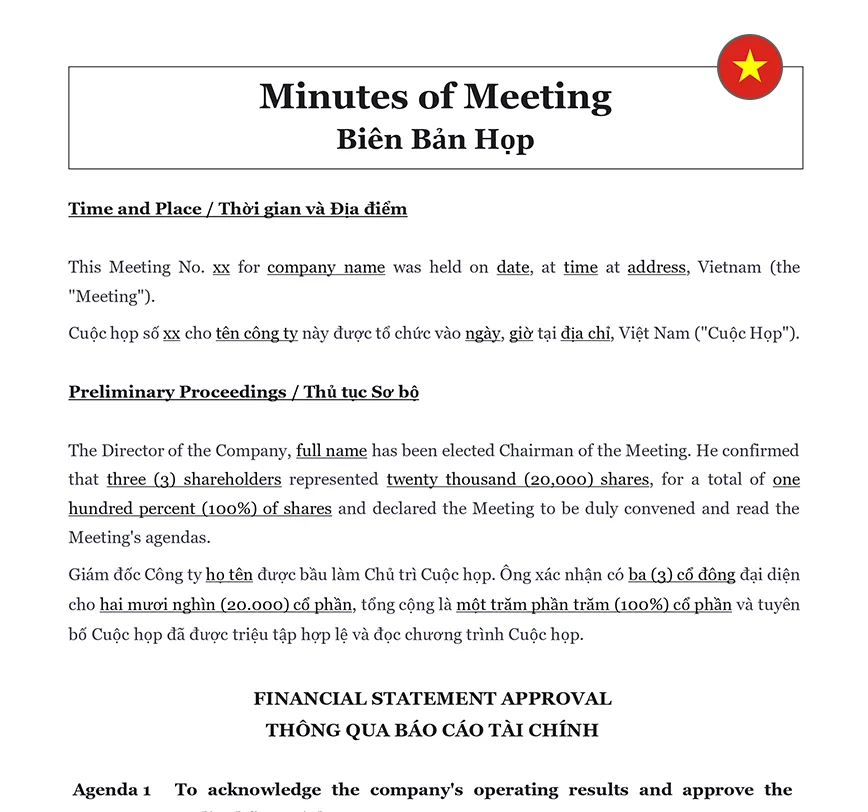Ready to use legal template
Drafted by experienced lawyers
Vietnamese-English translation
Ready to use legal template
Drafted by lawyers
Vietnamese-English translation
Home › Business contracts › Minutes of Meeting
Learn more about Minutes of Meeting in Vietnam
Minutes of Meeting are official written records that summarize the key points discussed, decisions made, and actions agreed upon during a meeting. They serve as a reliable reference for all participants and help ensure accountability and clarity across teams and departments. In Vietnam, maintaining accurate minutes is essential for corporate governance, regulatory compliance, and effective communication within companies, especially for board meetings, shareholder meetings, and internal organizational reviews. Well-drafted minutes provide legal protection and evidence of resolutions passed, which may be required by authorities or stakeholders. Download our Minutes of Meeting template available in an easy to edit Word format and drafted by expert in English and Vietnamese.
Table of contents
What are Minutes of Meeting?
What should be included in Minutes of Meeting?
Why are Minutes of Meeting important in Vietnam?
Who is responsible for taking Minutes of Meeting?
Can Minutes of Meeting be edited after they are finalized?
What are the consequences of not keeping Minutes of Meeting?
Can it be used as evidence in legal proceedings in Vietnam?
What should be done if there are errors in the Minutes of Meeting?
What are Minutes of Meeting?
Minutes of Meeting are official written records that document the discussions, decisions, and actions taken during a meeting. They typically include key details such as the date and time of the meeting, a list of attendees, summaries of discussions on each agenda item, any decisions made, and action items assigned along with their deadlines. These records serve as a historical reference, providing a clear and accurate account of what transpired during the meeting.
The importance of meeting minutes extends beyond simple documentation. They are crucial for future reference, ensuring that all participants have a shared understanding of the decisions made and actions to be taken. Additionally, minutes provide accountability, as they track assigned tasks and deadlines, and they can serve legal purposes by offering an official record of the meeting’s proceedings.
What should be included in Minutes of Meeting?
Minutes of Meeting should typically include the following information:
1. Meeting details: Date, time, location, and type of meeting (e.g., regular, special, emergency).
2. Attendees: List of people present at the meeting, including their names and roles (e.g., chairperson, secretary, attendees).
3. Apologies: Any attendees who were unable to attend and reasons for their absence.
4. Agenda items: A list of topics or agenda items discussed during the meeting.
5. Discussion summaries: Brief summaries of the discussions or key points made for each agenda item.
6. Decisions: Any decisions made during the meeting, including the outcome of any votes or polls.
7. Action items: Tasks or actions assigned to individuals or groups, including deadlines for completion.
8. Motions and resolutions: Formal proposals made and their outcomes (passed, failed, tabled).
9. Announcements: Any announcements made during the meeting that are relevant to the attendees.
10. Next meeting: Date, time, and location of the next meeting, as well as any proposed agenda items.
Why are Minutes of Meeting important in Vietnam?
Minutes of Meeting are important in Vietnam for several reasons:
1. Legal compliance
In Vietnam, keeping minutes of certain types of meetings, such as board meetings and shareholder meetings, is required by law. This ensures that organizations comply with relevant regulations and statutes.
2. Record of decisions
Minutes serve as an official record of the decisions made during a meeting. This can be important for clarifying decisions, assigning responsibilities, and holding individuals accountable for their actions.
3. Historical record
Minutes provide a historical record of the discussions, decisions, and actions taken during a meeting. This can be useful for reviewing past decisions, tracking progress on action items, and understanding the context of future meetings.
4. Transparency and accountability
By documenting the proceedings of a meeting, minutes promote transparency and accountability within an organization. They provide a clear record of how decisions were made and why, which can help prevent misunderstandings or disputes.
5. Reference for future meetings
Minutes can serve as a reference point for future meetings, helping to ensure continuity and consistency in decision-making and actions taken over time.
ℹ️ Themis Partner also offers a Notice of Meeting template that complements the Minutes of Meeting by providing a formal announcement and agenda for upcoming meetings.
Who is responsible for taking Minutes of Meeting?
The responsibility for taking minutes of a meeting typically falls to the designated meeting secretary or minute-taker. This role can be assigned to a specific individual depending on the organization or context of the meeting. Here are some common scenarios:
Corporate or Board Meetings: In formal settings such as corporate or board meetings, a corporate secretary or an assigned staff member often takes the minutes.
Committee or Team Meetings: For committee or team meetings, a designated member of the team, often the secretary or a rotating member, may be responsible for taking the minutes.
Informal Meetings: In more informal settings, the responsibility may be assigned to a specific individual by the meeting organizer or leader.
Professional Meetings: In professional associations or other organized groups, a designated officer, such as the secretary or administrative assistant, typically handles minute-taking.
Regardless of who is responsible, the minute-taker should ensure that the minutes are accurate, clear, and comprehensive, capturing all essential points of discussion, decisions made, and action items assigned during the meeting.
Can Minutes of Meeting be edited after they are finalized?
In general, minutes of meeting should not be edited after they are finalized, as they are intended to provide an accurate and unaltered record of the proceedings. However, there are some situations where edits may be necessary, such as to correct factual errors or clarify information that was not accurately captured during the meeting.
If edits are made to the minutes after they are finalized, it is important to clearly indicate that the document has been amended and to provide a rationale for the changes. It may also be advisable to inform all meeting participants of the edits and give them an opportunity to review the revised minutes.
In Vietnam, specific rules or guidelines regarding the editing of finalized minutes may vary depending on the organization and the nature of the meeting. It is always best to consult with legal counsel or follow any internal policies or procedures that govern the handling of meeting minutes.
What are the consequences of not keeping Minutes of Meeting?
The consequences of not keeping minutes of meeting can vary depending on the jurisdiction and the nature of the organization. In Vietnam, failing to keep minutes of certain types of meetings, such as board meetings or shareholder meetings, may result in legal and regulatory consequences. For example:
| ➤ Non-compliance: Failure to keep minutes as required by law can lead to non-compliance with legal regulations, which may result in penalties or fines. |
| ➤ Lack of record: Not having minutes means there is no official record of the discussions, decisions, and actions taken during a meeting. This can lead to misunderstandings, disputes, and difficulties in proving what was agreed upon at a meeting. |
| ➤ Accountability and transparency: Minutes provide a transparent and accountable record of how decisions are made within an organization. Without minutes, it may be difficult to track the decision-making process or hold individuals accountable for their actions. |
| ➤ Legal disputes: In the event of legal disputes or challenges, minutes can serve as important evidence to support the organization's position. Without minutes, the organization may have difficulty proving its case. |




